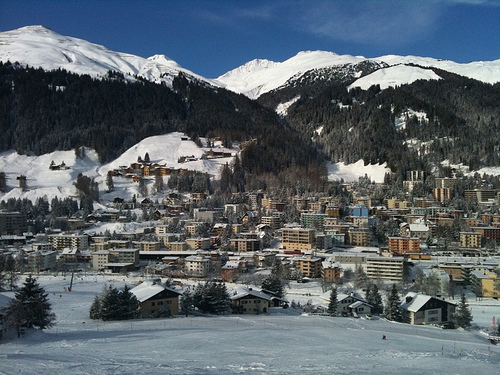Why Davos made me feel like a kid-in-a-candy shop
Davos is a nirvana for public affairs junkies like me. On arriving, I faced the kid-in-the-candy-shop syndrome: which sweetie jar should I dip into? Aside from the obvious keynotes (David Cameron, Angela Merkel, Dmitri Medvedev, Christine Lagarde, Mario Draghi, Henry Kissinger) which sessions should I be attending? The session on digital infrastructure or on the role of banks in the real economy? Or on social issues of youth unemployment, ageing preparedness or gender balance? Or on global risks – food security, energy security and cyber security? The choice is endless at a forum where all the issues affect one or other of our clients or are simply issues you care about as a citizen. By the end my WEF moleskin notebook was bursting.
Much is reported through the press, but I came away with three key ‘notes to self’. The first is that the immediate Eurozone crisis may be over, but there is a long road ahead. Critical policy measures and reforms need to be implemented, not just promised; and low hanging fruit needs to be effectively captured, notably the completion of the single market particularly in services and energy, the pursuit of bilateral free trade agreements and the rationalization of the EU budget, before the Eurozone can expect growth. In the meantime road bumps can still be expected, not least with Italian and German elections this year and the uncertainty of the UK referendum looming. Christine Lagarde of the IMF and others warned repeatedly against any hint of complacency.
The second is that the US was notably absent from the political keynote stage (barring the WEF old faithful, Henry Kissinger.) This is understandable given the timing of the inauguration of Obama’s second term, but it also hinted at the fact that the US is pulling back from the international stage to focus on domestic issues. The boost from shale gas to domestic production and energy cost reduction and the US’ desire to be more energy self-sufficient came up regularly in conversation.
The third is that Asia and Africa are active and increasingly engaged in world affairs: the former had leading senior officials, academics and business people on many panels, and there was much celebration of Africa’s growth of 6% and promise of more to come.
Beyond the dense content, there is also the PA celebrity factor that makes Davos special. Not footballers or popstars, but the people I get really excited about seeing live in action, such as the prime ministers of Italy, Netherlands, Denmark and Ireland together on a panel debating Europe. And later I witnessed EP President Martin Schulz at a single lunchtime roundtable with UK Finance Minister George Osborne, Commissioners Almunia and Rehn, German vice-Chancellor Roessler and former EU High Representative Javier Solana…all addressing ways to stimulate Europe’s competitiveness. As one speaker put it, we know what needs to be done, we just don’t know how to do it!
Key media editors such as Martin Wolf of the FT were omnipresent, busy chairing discussions. Others participated in debates such as the ‘From Tabloid to Tablet’ session with Stephen Adler of Reuters, John Gapper of the FT and Richard Edgar of ITV News, looking at the future of traditional media in the online world. The conclusion, happily, was that quality journalism with its verified facts, critical judgment and analysis still has an important place in an era of information overload.
NGOs of all kinds were active and engaged: Huguette Labelle of Transparency International had particular prominence as one of the Co-Chairs of the WEF 2013 meeting. And Transparency was a key theme running through the speeches of both David Cameron and Christine Lagarde in both political and economic contexts.
Last but not least, the Magic Mountain was bestowed with glints of royal glamour as I caught sight of Prince Andrew, HRH the Duke of York, Prince Philippe and Princess Mathilde of Belgium, and Crown Prince Hakon and Crown Princess Mette-Marit of Norway, all actively representing their countries, causes and charities.
The dimensions of Davos are hard to describe, with so many leading figures from all parts of the world gathered for an intense five days. The event admittedly comes in for much public scrutiny and criticism on many levels, but my sense is that the veil of secrecy is beginning to lift as WEF faces its own Transparency debate, reconciling its Chatham House rules with the legions of Tweeters from the conference. On the other hand it reminded me how fortunate those of us are who work in public affairs. While many people go to Davos for an annual fix, those of us engaged in public affairs in Brussels on behalf our clients are effectively surrounded by these global debates, personalities and interest groups on an ongoing basis. Perhaps that is why I felt so at home in Davos.
Related articles
1
Find Out More
-
Are you fit for 2024? Communicating in a year of change
February 27, 2024










January 10, 2014 | 9:43 AM
[…] Davos made people ‘feel like a kid-in-a-candy shop’, then the Energy Forum in Sopot, Poland triggered the same feeling among energy geeks. This […]